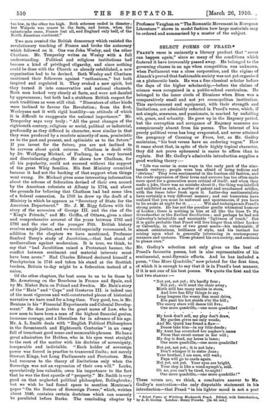THE EIGi±ThENTH CENTURY.'
TRH new volume of The Cambridge Modern History contains, like all its predecessors, much admirable work, and gives on the whole a good synoptic view of the period of time with which it deals. The drawbacks of this kind of syndicated
history are that you do not get a uniform standpoint through- out, and that the chapters are inclined to overlap. But in the case of so well marked an epoch as the eighteenth century the first disadvantage is little felt, for generations of historians
have established a concordat on its main features. In regard to the second drawback, there is a good deal of overlapping,
but this is almost legitimate, since the same war or Treaty has to be considered from different standpoints. The book does not cover the whole ground, for it begins roughly with the Peace of Utrecht and ends with the outbreak of the Revolution in France. The second limit of time is the more defensible, for the eighteenth century, whether we judge it by its politics or its spirit, begins either earlier or later. The
student must turn to other volumes of the History for detailed treatment of certain aspects of French and American history.
But, all things considered, there is no single volume known to us which gives anything like so complete an estimate of the movements of the century. The editors, as is their custom, sum up most judiciously in their preface the main features of the age. They point out that revolution showed its head long before its great outburst in France, for the First Partition of Poland was a step as subversive of the authority of publics law in Europe as the propaganda of Robespierre. The intellectual note of the century, they say, is "enlighten- ment—the self-confident revolt of the trained human intellect against tradition for tradition's sake " ; and since political lagged far behind intellectual development, this " enlighten- ment " came naturally through the authority of a benevolent despotism, and therefore had no security for continuance. The close of the century saw the world labouring in blood and
smoke to find a new polity which should be adequate to the Aufkliirung, and in the search materially changing its ideals. The weaknesses of the age, as Goethe has pointed out, were its hardness, its contempt for the originality which was more constructive than critical, and its impatience at the "slow
process of historic growth." It was bound, therefore, to be a period of tremendous political change, but the organic stability of the changes had yet to be tested.
Dr. Ward's opening chapter on "The Hanoverian Succession" is, as one might expect, an excellent piece of history. Mr. Temperley, whet deals with the age of Walpole, is perhaps a little too fond of an epigram, but his
argument is sound, and his study of Walpole is as acute as it is reasonable. Walpole was par excellence the Merchants' Minister, like Peel at a later date. To keep the new dynasty firm on the throne he aimed at reconciling the commercial classes by means of an active policy framed for their benefit, while "the country gentry were to be won by legislative sloth." The catchwords in British policy were "balance of power" and "balance of trade," and to the latter we owe the great interest which England began to evince in her Colonies.
England wanted a "balance of trade" in her favour, and therefore in the long run her mercantilist policy was unfavourable to the Colonies. She wanted a "self-sufficing Empire " ; but it was to be run for her benefit. Not till Adam Smith do we find a recognition of the true Imperial doctrine that the interest of the Mother-country and the Colonies is indivisible and identical. The contemporary French Imperial schemes were more far-sighted, but they failed because they neglected present conditions :—
" Walpole recognised what appeared to be, the French what ought to have been, the facts; neither saw the facts as they really were. Walpole's aim was mainly economic, and his calculations were therefore too short—the French -mainly political and their calculations therefore too long; in the one case the ideals were • The Cambridge Modern History. Edited by A. W. Ward, de. Vol. V1., "The Eighteenth Century." Cambridge : at the Univeretty_Prem. [16e. net.]
too low, in the other too high. Both schemes ended in disaster; but Walpole was nearer to the facts, and henoe, when the catastrophe came, France lost all, and England only half, of the North American continent."
Two men created the British democracy which resisted the revolutionary teaching of France and broke the autocracy ' which followed on it. One was John Wesley, and the other Chatham. Mr. Temperley writes on Wesley with a full understanding. Political and religions institutions had become a kind of privileged oligarchy, and since nothing could be done with the Church as already established, a new organisation had to be devised. Both Wesley and Chatham cautioned their followers against "enthusiasm," but both inspired and regulated it. They evoked a new spirit, but -they turned it into conservative and national channels.
Both men looked very clearly at facts, and were not dazzled by appearances ; but both had a stubborn British respect for such traditions as were still vitaL "Dissenters of other kinds were inclined to favour the Revolution ; from the first, Wesleyans met it with rigid hostility—an attitude of which it is difficult to exaggerate the national importance." Mr. Temperley says very truly : "All the great changes of the eighteenth century, religions or social, political or industrial, profoundly as they differed in character, were similar in that they were produced by a resolute minority of men, pessimistic as to the past and present, and optimistic as to the future." If you invest for the future, you are not inclined to be nervous about quick returns. Chatham is dealt with by Dr. Wolfgang Michael, of Freiburg, in a very learned and discriminating chapter. He shows how Chatham, for all his popularity, could not succeed without the support of the great Whig families. His first Ministry crumbled because it had not the backing of that support when things went wrong. Dr. Michael gives some interesting information about the scheme of federation devised of their own accord by the American colonists at Albany in 1754, and about the grounds for believing that Chatham had had some idea
of a federal connexion. In 1766 he drew up the draft of a Ministry in which he appears as "Secretary of State for the American Department." Mr. J. M. Rigg follows with the
story of the accession of George 111. and the rise of the "King's Friends," and Mr. Griffin, of Ottawa, gives a clear and comprehensive account of the years between 1782 and 1793 and the rise of the younger Pitt. British history receives ample justice, and we would especially recommend, in addition to the chapters we have mentioned, Professor Sanford Terry's study of Jacobitism,—that last stand of mediaevalism against modernism. It is true, we think, to say that "had Jacobitism raised a Protestant banner, the conflict between sentiment and material interests must have been acute." Had Charles Edward declared himself a Presbyterian in 1745 and taken his stand at the Scottish borders, Britain to-day might be a federation instead of a union.
Of the other chapters, the best seem to us to be those by Mr. Armstrong on the Bourbons in France and Spain, and by Mr. Nisbet Bain on Poland and Sweden. Mr. Bain's story of the "Hats " and " Caps " and Gustavus III. is indeed one of the most vigorous and well-constructed pieces of historical narrative we have read for a long time. Very good, too, is Mr. Benians in his "Financial Experiments and Colonial Develop-
ment." He does justice to the great name of Law, who is now seen to have been a man of the highest financial genius,
immense courage, and a liberalism far in advance of his age. Mr. A. L. Smith deals with "English Political Philosophers in the Seventeenth and Eighteenth Centuries" in an essay full of trenchant good sense and memorable phrases. He has a great admiration for Hobbes, who in his eyes went straight to the root of the matter with his doctrine of sovereignty, inseparable and indivisible. "Each holder of sovereign power was forced in practice to transcend limits ; not merely Stewart Kings, but Long Parliaments and Protectors. Men had recourse to the theory of limitations only when the Sovereign was not an expression of their own will." Locke, speculatively less valuable, owes his importance to the fact that he was the first apostle of "property." Mr. Smith is very good on that neglected political philosopher, Bolingbroke; but we wish he had found space to mention Montrose's paper "On the Nature of Sovereign Power," which, written about 1640, contains certain doctrines which can scarcely be paralleled before Burke. The concluding chapter by Professor Vaughan on " The Romantic Movement in European Literature" shows in model fashion how large materials may be ordered and summarised by a. master of the subject.







































 Previous page
Previous page